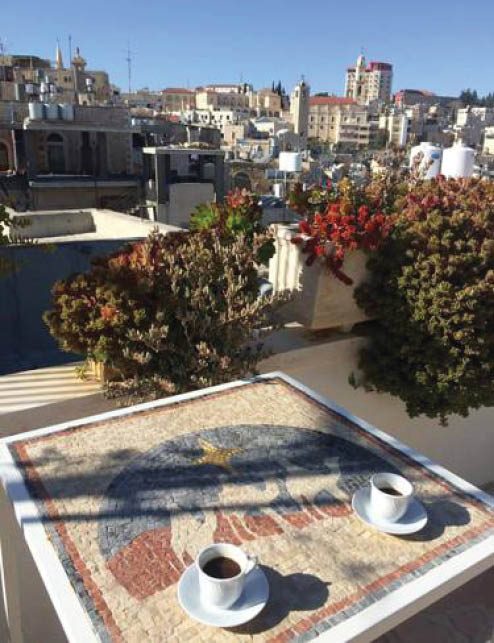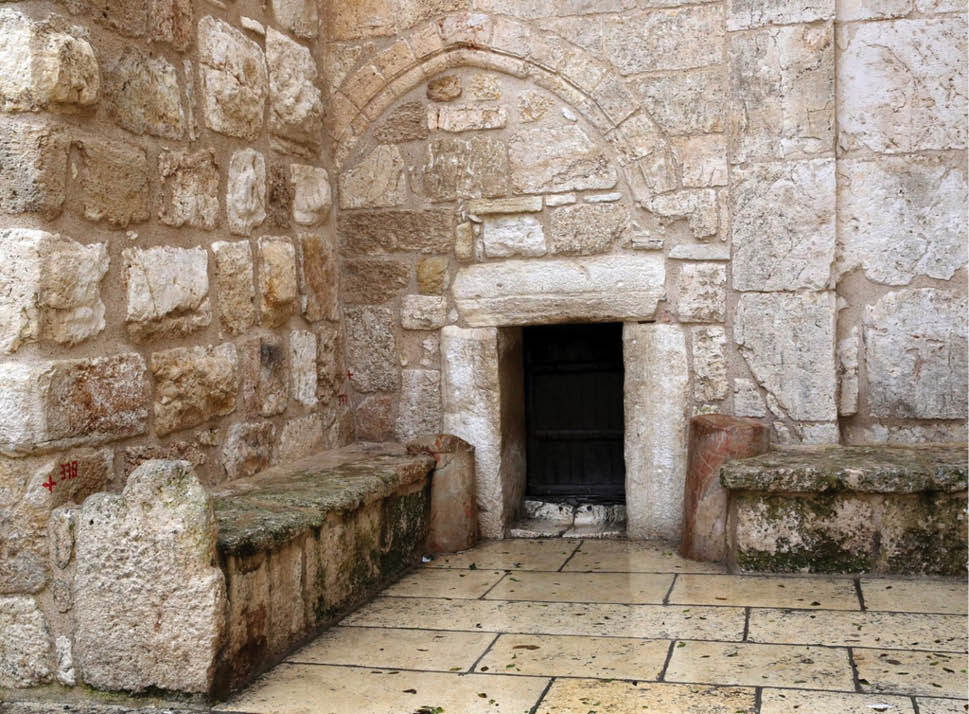The global impact of the coronavirus on companies has shaken the hospitality industry to its core. We can expect a global contraction – or worse – for the tourism business in the near future, as the impact of COVID-19 on world tourism is unquestionable, and the forecasts of authorities are based on previous experiences with similar crises, such as the outbreaks of SARS or H1N1.
The scope and duration of the great crisis that is just beginning within the hospitality industry due to the novel coronavirus pandemic are unknown. The International Air Transport Association (IATA) estimates that global air transport revenues will be reduced by 5 percent this year, which means a reduction of US$29.3 billion (about €27,000 million). The United Nations World Travel Organization (UNWTO) has revised its 2020 forecast and estimates that global international tourist arrivals could decline anywhere from 20 to 30 percent.
In Palestine, the year 2019 witnessed an unprecedented increase in the number of tourism arrivals and was considered a record year with the arrival of a total of 4.5 million tourists, compared to 4.1 million in the year 2018 and 2.8 million in 2017. This increase created a significant impact on the local economy. The positive multiplier effect touched the various service providers and value chain suppliers, thus creating a favorable investment climate and stimulating healthy and promising growth for a dynamic yet traditionally politically sensitive economic sector.

Over the past two decades, the tourism industry has experienced several dips, especially during the second Intifada (2000–2006) when the industry almost collapsed. International tourist arrivals diminished, hotels closed down, tour operators’ debts accumulated, tourism transportation companies ceased to exist, professional tourist guides changed their profession to survive, and the traditional handicrafts industry almost vanished.
Unlike other economic sectors in Palestine, the hospitality industry has ceased to exist, and there will be long-term ramifications for its future sustainability. It will take the sector a longer time to recover than other sectors, before it can turn around to once again become an active contributor to the GDP.
Due to the resilience and strong determination of the Palestinian private sector, however, the majority of the industry’s stakeholders have managed to recover gradually after every crisis. They built up their presence in a highly competitive ecotourism environment that, on the one hand, is governed by external factors that are beyond our control, such as the absence of sovereign border crossings and international entry points, while on the other hand, must operate in the absence of proper laws and regulations that could govern this promising economic sector.
Recovery efforts always focused on debt rescheduling, bank loans, and credit facilities, as well as the creation of partnerships and joint ventures to mitigate the risks and initiate large-scale investments, particularly in the hotel sector, to accommodate the forecasted increase in international tourist arrivals. According to a Paltrade Report (April 2020), the estimated total number of hotel rooms in the areas under the Palestinian Authority and East Jerusalem increased to 11,576 rooms in 210 hotels.
The positive marathon started during the last quarter of 2019 and lasted into 2020, with every tour operator running to close a deal and solicit confirmation of reservation requests for the available rooms, as every guesthouse, bed-and-breakfast premise, church lodging, and hotel was booked. Many groups arrived without having secured accommodation; tour operators paid prime prices to upgrade their groups based on the availability of rooms. The reservations dominated the rare cancellations of bookings, online booking engines steamed, and networks collapsed under the heavy load of requests. Everyone saw the finishing line. But no one expected the tracks to disappear!
The landing of the novel coronavirus began with speculation and ended up as the nightmare of every investor, employee, supplier, and developer in the tourism and hospitality industry in Palestine. It has come to be described as the beginning of the end. The cancellations started flowing immediately, followed by the closure of international border crossings and later, Ben Gurion Airport. Consequently, the Palestinian hospitality industry started to witness the spread of the fever associated with the disease, and hotels were deserted, workers were let go and contracts terminated, tourist guides faced unemployment, tourism transportation companies’ fleets were stranded, restaurants were closed, and popular tourist sites were abandoned. It is more than a nightmare and worse that a horror movie. The hospitality industry has come to a complete standstill.

Numerous factors will hinder the revival of the worldwide hospitality industry and directly impact the Palestinian hospitality industry, prolonging the recovery period of the tourism sector. The international travel market will collapse as a result of the worldwide spread of the epidemic, and many destinations will have to limit the number of tourist arrivals to prevent and control any potential re-spreading of the virus. Tour operators and international carriers are expected to have to increase the cost of travel to compensate for their losses, as the anticipated recession and inflation in the world’s leading economies will focus mainly on recovery efforts and economic revitalization in other sectors and other destinations than Palestine. As international events around the world are being postponed, potential travelers will be discouraged from travel for relaxation and leisure out of fear of contracting the virus and will have a diminished discretionary income as a result of a sharp decline in income and, consequently, an accumulation of debt and financial obligations coupled with the liquidation of savings in an effort to remain sustainable during the crisis. There is no doubt that after the control of the virus, many new health and safety policies and procedures will be introduced and enacted as laws and regulations, which will further affect the hospitality industry.
Having seen a record year of growth in the hospitality industry in 2019, positively impacting the livelihoods of tens of thousands of Palestinians, the Palestinian tourism sector faces the challenge of mobilizing ways to recover the momentum while adapting to the new reality in the aftermath of the COVID-19 pandemic.
In the Palestinian context, several critical factors will be pivotal for a successful recovery and the revitalization of the hospitality industry in the aftermath of the pandemic. Most urgently, all industry stakeholders from the public and private sectors must be involved in the development of a five-year plan based on a comprehensive strategic framework. This plan should focus on recovery mechanisms in the aftermath of the pandemic, including but not limited to human resources rehabilitation, investment incentives, tax breaks and exemptions, marketing and rebranding initiatives, and access to finance. Thus, an investment fund for the hospitality industry with favorable lending conditions must be established, and access to capital must be given with help from the government through local banks. A renovation grants program should be established in cooperation with the Ministry of Economy and the Ministry of Tourism to encourage the ongoing restoration and renovation of hotel properties, allowing them to remain competitive and drive the market. Furthermore, the investment incentive provisions in the Palestinian investment promotion laws must be revised to ensure that investment becomes more appealing to investors in the aftermath of the crisis. Business regulations must be overhauled, and legislative intervention must help to reduce the demand for rent payments in affected facilities that otherwise would not be able to survive.

An online employment database for the hospitality industry should be created to facilitate hiring and the expedient mobilization of human resources after the COVID-19 crisis has ended. A cluster-based services platform for the hospitality industry would support efforts to reduce costs and help businesses and facilities retain a competitive position after the end of the crisis. Moreover, we must strive for the revival of the Palestinian Tourism Board with a clear mandate focused on the creation of an enabling ecotourism environment for domestic and international tourists. The tourism associations in Palestine must be revitalized, allowing them to become service driven and value-added catalysts, with the aim to be consolidated rather than fragmented. Finally, we should seek the engagement of international experts to review the current policies and procedures and incorporate new health and safety requirements at the various tourist and religious sites. Social distancing must be facilitated at all sites as a measure to curb the potential spread of the virus. Thus, investment in the renovation and rehabilitation of the tourism sites that require maintenance and restoration must take into consideration the new code of health requirements to secure the safety of visitors.
With its important religious sites and rich culture, traditions, and heritage, Palestine has valuable assets that can help revive tourism and attract travelers from all over the globe.
In conclusion, the Palestinian hospitality industry has been hit hard by the pandemic, and there will be long-term ramifications during the containment and recovery periods. It will reverberate negatively on the local economy in terms of income and jobs and lead to the loss of investment appetite in what has been a traditional, promising sector. It is clear that the resilience of the private sector is being tested once again at this juncture, with many challenges waiting ahead before we can hopefully ensure the full recovery and revitalization of a main sector of the Palestinian economy.



